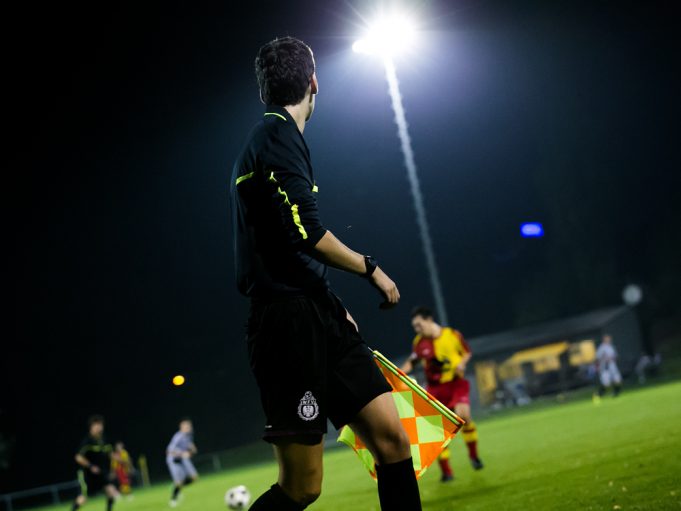We’ve all kicked a call. If you say you haven’t, you’re a liar or delusional. When it happens, it’s one of those situations in which you’re all alone. Boos may shower you. The coach is yelling. Where do you turn? How do you grow from the experience?
Mike McCarron, a San Francisco and Bay Area football official who has also worked other sports, finds he gets irritated at himself. “You start thinking, ‘Is it a lack of focus? Did I miss something?’ It’s so important to get it right, so I try to figure out what went wrong on my own and get refocused,” he said.
Like other officials, he recognizes you have to put the bad call behind you. You also need to ask yourself questions, like, “Was I in the right position? Did I prepare for the situation?” McCarron said that he is like many other officials and is his “own worst critic.” Getting over that internal criticism is integral to success.
Kelly Witt has a slightly different perspective. Because she started officiating soccer at an early age (working her way up to three NCAA Division II championships), she learned to rely quickly on peers for support. “You need to fix it or eat it, then apologize later,” she explained. “Video helps for looking at the call later, but on the field you have to make the quick decision and live with it.”
She cited an example when she started out, working a kids’ game, and an injury occurred. She hadn’t tracked the time properly and had no one to rely on, so she made a best guess and moved on. “You need to sell it,” she said with a chuckle, in that type of situation.
Susan Bargo, a former NCAA Division I women’s basketball official who currently helps Sally Bell administer six leagues, said that in all situations, you need to prepare for the game, be confident, have proper rules knowledge and game management skills. That minimizes the potential for missing the call but doesn’t eliminate it, she admitted.
“When you kick a call, it feels like you’re alone, but you’re not. Others have come before you, and others will come after you. Remember that fans and coaches have short-term memories,” she said.
“Don’t let one mistake cost you the next three to four calls,” Bargo advised. In other words: Get over it. She also suggested using your partner for help, maintaining good eye contact and developing a support system (mentor). “Use their experience before, during and after games,” she said. “It helps you recover and move forward.”
Chuck Walters, a high school baseball umpire from Jackson, Mich., agreed that when he kicks a call, “I’m the first one to know it. No one feels worse than the official, whether it’s at the major league or Little League level. Get ready for the next pitch or play. That’s coming at you in seconds.”
If you can’t get over the call immediately, he said, things will go downhill in a hurry. “Concentrate, then figure out what went wrong,” he advised. “Was your timing too quick? Were you out of position? Were you unfamiliar with a rule?”
Walters, too, suggested using your partner as a reality check. “Am I that bad” or is the criticism justified?
What's Your Call? Leave a Comment:
Note: This article is archival in nature. Rules, interpretations, mechanics, philosophies and other information may or may not be correct for the current year.
This article is the copyright of ©Referee Enterprises, Inc., and may not be republished in whole or in part online, in print or in any capacity without expressed written permission from Referee. The article is made available for educational use by individuals.


















